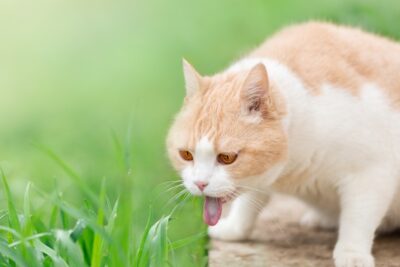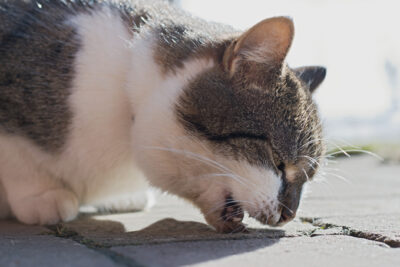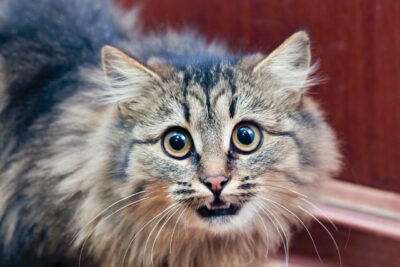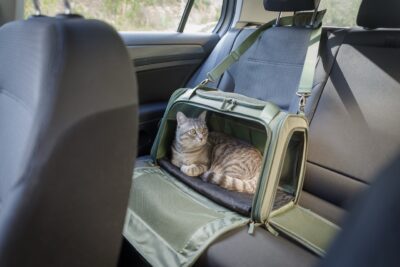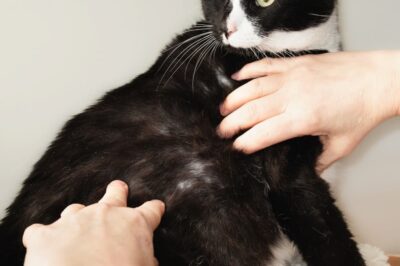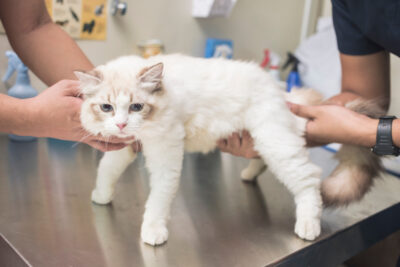Mucus in Cat Poop: What It Means

All featured products are chosen at the discretion of the GreatPetCare editorial team and do not reflect a direct endorsement by the author or reviewer.
Your cat’s digestive system does so much more than just process the food they consume. It not only mobilizes nutrients, but it also aids in rebalancing water and electrolyte content, helps produce hormones, and has a significant role in the body’s immune system. Therefore, gut health is a huge component of your cat’s overall health.
And since monitoring your cat’s poop is a way of indicating how healthy their gut is, paying attention to its composition is an important method of understanding your cat’s overall health. So when your kitty’s stool begins to look soft and slimy, it’s time to talk to your veterinarian. Read on for everything you need to know about mucus in cat poop, including prevention tips.
Mucus in Cat Poop: What Does it Look Like?
Small amounts of clear mucus are normally produced by the GI tract to help lubricate fecal material as it passes through the colon, rectum, and anus. Therefore, a bit may be observed in a normal solid bowel movement as a clear-to-white gelatinous product.
However, if your cat’s poop contains a large amount of what appears to be a slimy jelly, especially if the stool is diarrhea, blood-tinged, or contains green mucus rather than clear, your pet parent super powers should be tingling with the sense that something is off with your cat’s gut health.
Observing the color, consistency, and presence of blood or mucus in your cat’s stool can help your veterinarian better pinpoint which area of your cat’s digestive tract is affected by GI upset. For instance, mucoid diarrhea (or mucus in soft or runny poop) indicates something is wrong with the large intestine.
What Causes Mucus in Cat Poop?
While a small amount of mucus in your cat’s stool is normal – lubricating the poop to make bowel movements more comfortable and to protect the bowel lining – larger amounts of mucus are abnormal.
The cause of excess mucus in cat poop is an indication of colitis (when the bowel is irritated or inflamed) to help further protect the lining of the colon until inflammation resolves. With that in mind, we’re going to break down common causes of colitis, as well as other causes of mucus in cat stool.
Some causes of colitis in cats include:
- Dietary indiscretion
- Parasites
- Inflammatory bowel disease
- Bacterial overgrowth
- Stress
- Food allergies
- Systemic diseases
- Viral infections
Dietary indiscretion
Consuming something that doesn’t agree with your cat’s digestive system (dietary indiscretion) is one of the most common causes of colitis. If the GI tract isn’t used to processing a certain food, or if too much of a certain food is consumed (especially something fatty or oily), the lining of your cat’s colon may become inflamed, resulting in excessive mucus production and diarrhea. Cases of dietary indiscretion tend to resolve on their own within a few days and are best managed with a bland diet until stool improves.
Parasites
Gastrointestinal parasites are especially common in cats with outdoor access (and thus, possible exposure to wild animals that carry parasites) and exposure to the stool of other pets that may be parasitized. Certain parasites can also be transmitted by the consumption of certain insects, such as fleas, which can transmit tapeworms.
Parasites such as roundworms, hookworms, whipworms, Giardia, coccidia, and tapeworms can lead to intestinal disease, including colitis. Diagnosis is made via fecal flotation test in most cases, and proper anti-parasitics are used to treat. Young kittens are especially at risk for acquiring and suffering from GI parasites. Many parasites can also be transmitted to kittens from their mothers, so proper deworming is important in these young babies.
Inflammatory Bowel Disease (IBD)
IBD in cats is a relatively common cause of colitis, resulting in chronic diarrhea due to uncontrolled inflammation of the colonic lining. Sometimes, vomiting can concur. Your veterinarian may prescribe a special prescription diet and anti-inflammatory drugs to suppress an exaggerated immune response of the colon.
Bacterial overgrowth
Exposure to certain bacterial organisms or overgrowth of others that typically live in low numbers in the large intestine can lead to diarrhea and excess mucus production. Mucus may even take on a green color or otherwise be red-tinged from colonic lining bleeding.
Consuming spoiled food or dead animals can lead to Salmonella or E. coli exposure, and raw diets are more likely to have much higher levels of harmful bacteria or parasites than cooked or commercial foods. Other disorders causing inflammation of the bowel can result in an overgrowth of Clostridium. Plus, any imbalance between “good” and “bad” bacteria (or flora) in the gut can lead to GI upset. Antibiotics and probiotics may be prescribed by your veterinarian.
Stress
While stress-induced colitis is more common in humans and dogs, cats can occasionally be affected. Cases tend to resolve on their own once the source of your cat’s stress resolves.
Food allergies
While food allergies are overall uncommon in cats, food sensitivities and allergies can cause inflammation of the stomach, small intestine, and large intestine. Cases are typically managed with a hypoallergenic diet, either via a hydrolyzed diet or novel protein source to which your cat has not yet been exposed.
Systemic diseases
Diseases that stem from elsewhere in the body can sometimes trigger inflammation in the colon, resulting in mucus in cat poop. Such systemic diseases include chronic kidney disease (CKD), hyperthyroidism, liver disease, feline leukemia virus (FeLV), and feline infectious peritonitis (FIP).
Viral infections
Certain viruses can affect the intestinal tract, including the colon. For instance, feline parvovirus (also called feline panleukopenia) can cause excessive mucus or blood in diarrhea among its many other consequences to the body. Young, unvaccinated kittens are especially at risk. Proper vaccination can help protect your kitty from this virus.

Next, let’s move on to some of the other causes of mucus in cat stool:
- Lymphoma
- Colorectal polyps and other masses
- Anal gland abscess
- Constipation
- Intestinal blockages
Lymphoma
GI lymphoma is unfortunately one of the most common cancers in older cats. It typically affects the small intestine, but the large intestine can also be affected. Cases are typically managed with steroids and chemotherapy drugs.
Colorectal polyps and other masses
While tumors of the colon are quite uncommon, masses (benign or malignant) can lead to excessive mucus production and sometimes diarrhea, constipation, or bloody stool. Surgery may be recommended.
Anal gland abscess
Anal gland issues do not often affect cats, but occasionally, an infection or impaction can lead to an abscess that can lead to more mucus seen in the stool. These cases are medically or surgically managed by a veterinarian.
Constipation
Constipated cats may have difficulty passing stool. Instead of diarrhea, stool will be very hard and firm and may be coated in a mucus film. Your vet will diagnose the cause of your cat’s constipation and manage appropriately with extra water content in your cat’s diet, enemas, and/or a stool softener.
Intestinal blockages
Intestinal blockages (or obstructions) can result in only mucus being passed from the body rather than a full bowel movement. The cells in the lining of the intestines are still functioning to make mucus in these cases, but eventually, no more stool is going to be able to pass around the blockage to make its exit from the body. Therefore, if you notice your cat is straining to defecate and only mucus is being produced with no poop, and if they’re also vomiting, lethargic, and not eating, seek vet care immediately to rule out a possible GI foreign body resulting in an intestinal blockage. Surgery is typically required.
What to Do if Your Cat Has Mucus in Poop
Depending on the underlying cause, mucoid diarrhea can occasionally resolve itself within a few days, even sooner with some supportive care. However, other cases require veterinary attention to help resolve them completely.
If your cat is eating well and otherwise acting normally aside from some mild mucus output in soft stool, you can monitor to see if the condition improves or resolves within the next few days. During this time, you can offer your cat a bland diet to help speed up the healing process.
While parents of dogs with tummy issues are often advised by their veterinarians to feed plain chicken and rice for a few days until their dogs are on the mend, additional special care should be taken with cats. While a few days of plain chicken (no skin, bones, oil, or seasoning) with a tiny amount of plain cooked white rice can be fed to adult cats if they’re struggling with diarrhea, avoid feeding your cat this diet for too long as it lacks many essential nutrients that felines require. Furthermore, too much rice can lead to worse GI upset since cats are not as adept at digesting rice as dogs are.
Better yet, ask your vet for a prescription formula lower in fat and easier for the GI tract to digest, such as Hill’s i/d Digestive Care canned or dry food. This diet is much more nutritionally balanced than plain home-cooked chicken and rice.

Mucus in Cat Poop: When to Seek Help

Many cases of mucus in cat poop can resolve on their own or with a bit of TLC, but if the condition of your cat’s stool persists for over a week without improvement, or, if your kitty worsens to the point that they’re experiencing the following concurrent signs, it’s definitely time to call your veterinarian:
- Vomiting: nausea and vomiting may indicate inflammation in the stomach or small intestines. A GI foreign body also triggers vomiting
- Lethargy
- Not eating
- Abdominal distension or bloating: Excessive gas, fluid in the intestines, or free abdominal fluid can cause visible swelling of the abdomen.
- Dark tarry stool: Bleeding from the stomach or small intestine can result in very dark brown to nearly black stool, whose color is caused by digested blood.
- Fresh blood in stool: Bright red blood can indicate bleeding from the colon, rectum, or anus.
- Liquid diarrhea pouring from your cat
- Straining to defecate but only producing blood or mucus without stool: your cat may be constipated or have an intestinal blockage.
While adult cats can often withstand the effects of diarrhea for a few days, kitten diarrhea can quickly devolve to a much more severe issue. Therefore, always speak with your veterinarian if you have a young kitten that begins having diarrhea. Fluid loss from diarrhea can quickly lead to dehydration in kittens, whose tiny bodies and immature immune systems require much more involved medical efforts to bounce back.
If your cat is alert and eating with only a small amount of mucus observed in soft poop, you can likely wait and see your regular GP vet in the next couple of days. However, if your cat is severely ill, seek vet care immediately at your closest ER. Bonus points if you’re able to provide a fresh stool sample to bring with you to your visit to help expedite diagnostic testing!
Keep in mind that expenses and wait time in the ER are generally much greater than in a GP clinic, but in a true emergency, your local ER will be better equipped to handle severe cases.
Pet parents should expect the following:
Physical examination
Once your veterinarian takes a full history regarding when you began seeing mucus in your cat’s poop and a description of any other symptoms they’re exhibiting, he or she will perform a thorough physical exam. This will include taking your cat’s vitals and feeling their belly.
Fecal floatation test
A stool sample will be collected to search for the presence of common GI parasites in poop.
Direct fecal smear
A thin layer of feces may also be placed on a microscope slide to search for an overgrowth of certain bacteria.
GI panel
Your veterinarian may send out special testing to look for other infectious diseases that can affect the colon.
Abdominal radiographs or ultrasound
Radiographs (or X-rays) of your cat’s abdomen may be taken, and an ultrasound scan of the intestines may also be performed.
Bloodwork
Occasionally, bloodwork may be obtained if your vet is concerned that your cat’s diarrhea is secondary to another issue in the body.
Colonoscopy
If your cat has had a chronic history of mucoid diarrhea that has not been diagnosed with other testing, they may be scheduled for a colonoscopy, in which a scope with a camera is inserted through your anesthetized cat’s anus to help visualize the lining of the large intestine. Tissue biopsies may be taken during this time and submitted to a pathologist.
Diet Trial
Your veterinarian may prescribe a special diet for six to eight weeks to see if the diarrhea resolves. This is followed by re-introduction of your cat’s old diet to see if they experience a flareup of symptoms, which is a way to diagnose food allergies.
Depending on the underlying cause of mucus in cat poop, your vet may prescribe medications such as anti-parasitics, antibiotics, anti-inflammatory drugs, and probiotics. Fluids may be administered if your cat is dehydrated from water loss from diarrhea.
How to Prevent Mucus in Cat Poop
Pet parents can help support a healthy colon and overall healthy GI tract in their cats by preventing the preventable, meaning taking prophylactic measures to avoid some of the most common causes of cat poop mucus: dietary indiscretion and GI parasites. By feeding a healthy commercial feline diet, avoiding table scraps and human foods, and maintaining a healthy weight, your cat will be less likely to suffer colitis and excessive mucus in their stool.
Diets such as Purina Pro Plan, Hill’s Science Diet, Iams, and Royal Canin are formulated by a veterinary nutritionist, undergo extensive feeding trial studies, and are tested for quality and safety. Therefore, sticking with one of these diets is optimal for most cats.



Kitties with sensitive tummies may also benefit from a sensitive skin and stomach diet by Purina or Hill’s, and you can always check with your veterinarian about a prescription diet as needed. Furthermore, avoiding raw food helps reduce bacterial and parasitic contamination, thereby reducing the chance of colitis and other GI problems.


Monthly prescription prevention products from your vet can help control many GI parasites. Many flea products for cats can also help prevent other parasitic infections, including common GI parasites like roundworms and hookworms. Keeping your cat indoors (to minimize the consumption of parasite-ridden wildlife and exposure to other animals’ stool) and consistent use of year-round parasite prevention can help reduce your kitty’s parasitic exposure, thus reducing their risk of mucoid diarrhea from intestinal parasites.
Speak with your personal veterinarian about other measures to optimize your cat’s gut health. While not necessary in the majority of cats, others may benefit from a daily probiotic specifically formulated for kitties.
Those with chronic constipation may improve with extra water content in their diet (such as canned food or Purina Hydra Care supplement) or a gentle stool softener. A boost of dietary fiber from either a special diet or supplement may also help. Remember to always consult with your veterinarian before making changes to your cat’s diet.
